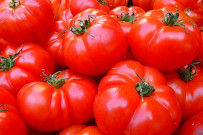New seasonal food-growing pilot in schools
Posted by Schooldays Newshound on 30/08/2021.
 Tags: Parenting Education And Politics
Tags: Parenting Education And Politics
“Tomatoes do not grow all year round in Ireland,” is just one of the many educational messages aimed at primary and secondary school students participating in a new seasonal food growing project - the SeasonsPace initiative - launched by DCU researchers.
DCU has partnered with Airfield Estate in Dublin, in collaboration with Dr GIllian Jein, an Urban Humanities scholar at Newcastle University, to support the growing of local food by communities, schools and individuals. The project's focus is on sustainability, making ethical choices and minimizing environmental impact, in an inclusive and health-giving way, while promoting awareness of what food is in season locally.
The pilot schools project involves seven participating schools across North and South Dublin, each of which has committed to growing seasonal foods during autumn, winter and/or spring for six weeks. This September, ‘a grow it yourself’ scheme of work will be rolled out across the schools, as urban students are encouraged to connect with the soil. Inclusion of the primary and secondary students at the Lycée français d’Irlande adds an intercultural dimension.
Funded by the Irish Research Council’s New Horizons 2020 scheme, Dr Dervila Cooke from DCU’s School of Applied Language and Intercultural Studies is the overall project leader and funding recipient. The DCU research team includes Dr Susan Pike and Dr Orla Kelly from the DCU Institute of Education as co-leaders on the schools element of the project.
Dr. Dervila Cooke said: “Today’s children are growing up in a world where supermarkets sell items like berries, fresh green beans, and even tomatoes all year round. Many of us have come to expect these items as basic ingredients that are always readily available. But when we look at the pace of climate change, it is more important than ever to promote an awareness of what food is in season locally.
“This project aims to create awareness among school children about the resources required to provide out-of-season fresh produce to supermarkets, so they can learn to make informed and ethical choices. By growing their own food, not only is it exciting, educational and empowering for them, but they will also learn about the time, energy, water, space and other resources required. There are several great initiatives in Ireland that encourage children to grow vegetables, but this one also encourages them to reflect on ethical issues around food production, as well as extending the growing activities into autumn and winter.”
According to Dr Cooke, seasonal food growing is not restricted to gardens and can take place in a variety of settings, including balconies, window boxes, patios and community growing spaces. School students and teachers will also take part in a survey before and after their activities, to measure the learning outcomes of the growing project.
Alongside school participation, the overall project will also promote the development of a community garden and food-growing network in Ireland, France and the UK, thanks to collaboration and support from Newcastle University and community gardens in Paris. This will culminate in a stakeholder workshop in October 2021, with international experts from community organisations, media and the food industry. A virtual event for Irish schools is also planned to accompany the international workshop.

No documents found